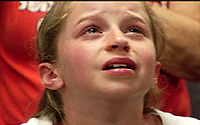 Though the documentary “Jesus Camp”–which goes inside Pastor Becky Fisher’s “Kids on Fire” camp in North Dakota–has only been playing in movie theaters in limited release for two weeks, it has generated a firestorm of controversy. I saw the movie several weeks ago at a film festival and found it one of the more difficult film-watching experiences I’ve had. Still, I have purposely taken these few weeks since first watching it to think carefully about what I want to say about “Jesus Camp” itself and about its distributors’ claim that the film “doesn’t come with a prepackaged point of view.”
Though the documentary “Jesus Camp”–which goes inside Pastor Becky Fisher’s “Kids on Fire” camp in North Dakota–has only been playing in movie theaters in limited release for two weeks, it has generated a firestorm of controversy. I saw the movie several weeks ago at a film festival and found it one of the more difficult film-watching experiences I’ve had. Still, I have purposely taken these few weeks since first watching it to think carefully about what I want to say about “Jesus Camp” itself and about its distributors’ claim that the film “doesn’t come with a prepackaged point of view.”
The documentary starts in Missouri, where we meet Becky Fisher, a woman who runs a kids ministry out of a large, conservative evangelical church. It is here at Fisher’s church that we also meet the three children whom the documentary follows most closely–Rachael, Levi, and Tory. These children are designated by Fisher as future spiritual leaders in “God’s army.” They and many other kids are taught to boldly share their beliefs with friends as well as strangers–and to develop their own “prophetic gifts,” such as speaking in tongues and healing, for use by God.
Fisher wastes no time before sharing with the camera the goal for her ministry, including the camp: She wants to raise a generation of children who are as passionate about influencing the United States for Jesus Christ as children raised in Muslim-extremist circles in the Middle East are passionate about serving the Taliban and other terrorist groups.
As the campers and Fisher rally together at Devil’s Lake, North Dakota, we are treated to such horrific images as campers holding plastic embryos while praying with huge tears in their eyes for the government to end legalized abortion, and children kneeling around a cardboard cut-out of George Bush while praying for him. In every scene, we see children whipped into an emotional frenzy by the adults, all in the name of worshipping God.
But wait, there’s more: A documentary about Christians wouldn’t be complete without working well-known pastor and political activist Ted Haggard into the movie. Toward the end of the film the directors show footage of Haggard speaking at his church in Colorado, where he reminds those watching that he and his followers–including their children–have the power to turn any election.
Whether you agree or disagree with the people in this film, it is difficult at best to argue that “Jesus Camp” doesn’t have an agenda–namely, to scare us into thinking that our freedoms are in grave danger because of those scary evangelicals. In the name of balance, the filmmakers sprinkle throughout the documentary radio talk-show segments featuring Air America host Mike Papaontonio–a self-proclaimed Methodist who frequently criticizes the religious right. The segments probably add up to less than 15 minutes of screen time and don’t really offer any insight–just a lot of ranting. That’s not balance.
And simply because there is no voiceover to manipulate the narrative of the film–a technique often used by filmmakers like Michael Moore–that doesn’t mean “Jesus Camp” isn’t carefully edited for maximum sensationalistic impact. It is. And I feel comfortable saying this because my own Christian background includes a hodge-podge of various experiences in different denominations.
I have been to camps similar to this one, so it is easy enough for me to pick out the scenes where events at the camp were being taken out of context and when they weren’t. The perfect example is when the children are praying for George Bush. It’s portrayed in the movie as idol worship of some kind, when really it is not so unusual for Protestant churches to look to Scriptures that instruct believers to pray for leaders in power. The same goes for the warfare references. There are references to spiritual warfare in the New Testament, but quoting those verses doesn’t necessarily make you a member of a militia group, as the movie implies.
But perhaps more disturbing than the images up on the screen is the fact that the directors have been aggressively promoting the movie to the Christian market in the name of cultural dialogue. There is no real dialogue going on here.
I originally felt that this movie could be significant for Christians to watch–not because I agree with what Fisher does or because I agree with the directors who filmed her, but because this movie could serve as a warning to the many moderate evangelicals in this country that the likes of Ted Haggard have completely drowned out the more tolerant, moderate evangelical middle, which the media seem completely disinterested in.
But “Jesus Camp” is not about a true discussion of politics and religion in our culture; it is simply creating a dialogue of fear. Between the closed-mindedness of the filmmakers and the closed-mindedness of the film’s subjects, the true message of “Jesus Camp” is: Freedom-loving Americans should be afraid of Christians. Christians should be afraid of liberals. And we should all be afraid of anyone who has a different worldview that we do. I consider both the subjects of this film and its creators equally guilty for this, and I think the best response is to refuse to join in their one-sided conversation.

